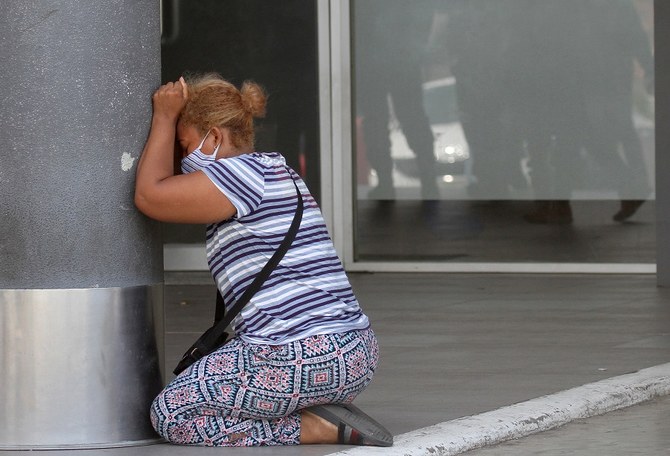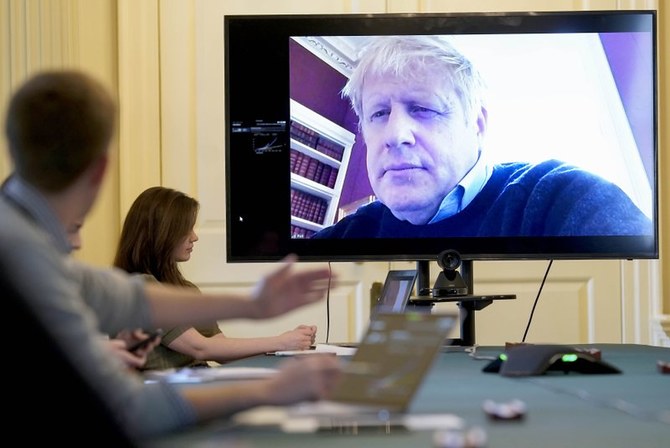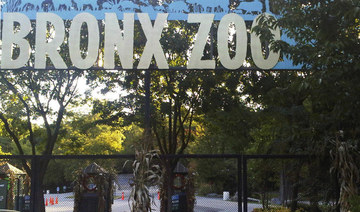DUBAI: Governments across the Middle East began further expat repatriations as the coronavirus death toll reached 69,444 on Monday.
On Sunday a chartered Emirates Airline plane flew out 345 British citizens who were unable to return home after the closure of UAE airports to international traffic on March 24.
Abu Dhabi also sent a second plane carrying stranded Lebanese expats abroad due to the virus on Sunday afternoon. Lebanese Minister of Tourism and Social Affairs, Ramzi Moucharafieh, said those who returned will be quarantined in the Lancaster hotels chain in Beirut’s Raouche area.
Monday, April 6 (All times in GMT)
20:00 - Egypt announces 149 new cases, 7 more deaths and 259 recoveries from the coronavirus.
19:30 - in Rome reports on how as the national lockdown in Italy due to the coronavirus pandemic is set to go on at least until Easter, if not longer, Italians are no longer singing on their balconies. READ HIS FULL ACCOUNT HERE.
19:00 - British Prime Minister Boris Johnson has been moved to the intensive care unit of a London hospital after his coronavirus symptoms worsened. FULL STORY HERE.

16:54 - Turkey’s death toll from the new coronavirus rose by 75 to total 649, and new confirmed cases rose by 3,148 to bring the country’s total to 30,217, Health Minister Fahrettin Koca said on Twitter.
He said 21,400 tests for the COVID-19 disease had been performed in Turkey in the last 24 hours.
16:20 - Kuwait placed a full lockdown on two areas and extended its partial curfew by two hours to run from 5 pm (1400 GMT) till 6 am effective Monday until further notice, a statement from the cabinet said.
It also extended a previously enacted suspension of work for all ministries and government institutions by two weeks until April 26 as precautionary measure against coronavirus.
16:25 - Qatar reports 228 new coronavirus cases, with 131 cases recovered.
16:20 - Deaths from the COVID-19 epidemic in Italy rose by 636 on Monday, more than 100 higher than the previous daily tally of 525, the Civil Protection Agency said, but the number of new cases fell sharply.
The total death toll since the outbreak came to light on Feb. 21 came to 16,523, the highest in the world.
16:00 - 103 more coronavirus cases were recorded in Algeria on Monday, meaning the total in the country has risen to 1,423.
15:35 - More than 5,000 people who tested positive for coronavirus have now died in Britain, official figures showed Monday, with a latest daily toll of 439.
“As of 5pm on 5 April, of those hospitalized in the UK who tested positive for coronavirus 5,373 have died,” the health ministry said in a tweet.
15:00 - German chancellor Angela Merkel says the European Union faces its biggest test since its inception and any possible easing of restrictions will be done step by step to not overwhelm the health system.
She also said Europe must develop “self-sufficiency” in producing masks “as something that we learn out of this pandemic” of COVID-19.
14:15 - The mother of Manchester City coach Pep Guardiola has died after contracting the coronavirus, according to a club tweet on Monday afternoon. FULL STORY.
13:40 - More than 20,000 Pakistani workers stuck in the United Arab Emirates are seeking to return home, as the Gulf Arab state tightens restrictions due to the coronavirus outbreak.
As the virus has spread, the UAE has gradually increased curbs, including imposing a nationwide curfew, suspending passenger flights and putting Dubai in a lockdown.
13:25 – The UAE reported 277 new cases of coronavirus, 23 recoveries and one death, bringing the country’s tallies to 2,076 total cases, 167 recoveries and 11 deaths.
13:15 - England’s hospital death toll from the coronavirus rose by 403 to 4,897, the National Health Service said.
The health service said 15 of the 403 patients had no known underlying health conditions.
12:15 - Riot police wielding batons used force to break up a protest by Pakistani doctors and medical staff against a lack of gear to protect against coronavirus, arresting dozens of medics who say the government has failed to deliver promised supplies. Reuters journalists at the scene, in the southwestern city of Quetta, saw hundreds of doctors and paramedics, some in face masks and scrubs, chanting their demands. Some were dragged off by riot police in helmets, armed with rifles and batons.

10:25 – Lebanon confirmed 14 new coronavirus cases and one death, bringing totals to 541 infected, and 19 fatalities.
10:05 – Iran’s total number of coronavirus infections topped 60,500 and the death toll from the outbreak reached 3,739, the country’s health ministry said.
09:40 – Spain’s coronavirus cases rose to 135,032 from 130,759 on Sunday, while the death toll has reached to 13,055 from 12,418 a day earlier.
09:30 – Iraqi Kurdistan has reported 41 new coronavirus cases in Erbil.
09:15 – The Kuwait health ministry confirmed109 new cases of coronavirus, increasing the total to 665.
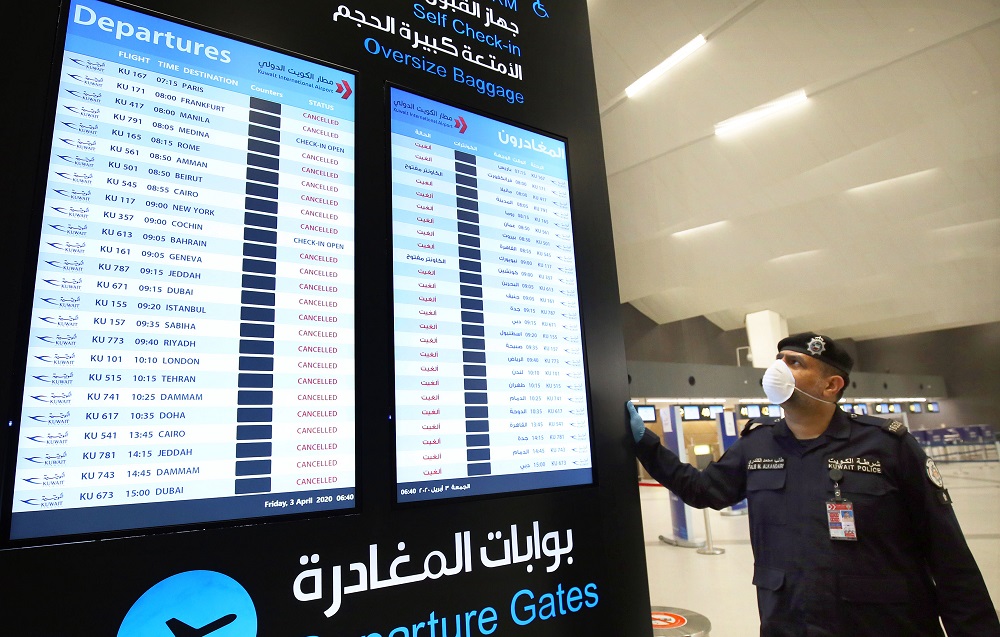
Above, a police man wearing a mask stands by flight information board at the Kuwait International Airport Terminal 4 on April 3, 2020. (AFP)
08:50 – Indonesia confirmed 218 new coronavirus cases, the biggest daily jump since the first cases were announced a month ago, taking the total number of infections to 2,491, a Health Ministry official said.
08:45 – Bahrain said that 19 people were released from quarantine.
08:40 – The Philippine health ministry reported 11 new coronavirus deaths, bringing total to 163, and 414 new coronavirus infections, bringing total to 3,660.
08:20 – Palestine said there were nine new coronavirus infections, with a total of 246.
07:45 – Saudi state TV reported that 176 Americans have left Dammam for Washington.
07:45 – Russia’s coronavirus case tally has risen to 6,343 in the past 24 hours, a record daily increase of 954, the country’s crisis response center said..
07:35 – Morocco recorded 92 new coronavirus infections, total has risen to 1,113 cases.
07:10 – Israel reported an increase in COVID-19 deaths, bringing toll to 51. There are currently 8,611 confirmed infections in the country.
07:05 – Singapore announced S$5.1 billion ($3.55 billion) in additional economic spending such as wage support, waiver of levies and one-off payments to combat the coronavirus pandemic. READ THE STORY
07:05 – Saudi Arabia has confirmed 61 new cases of coronaviurs, increasing toll to 2,463.
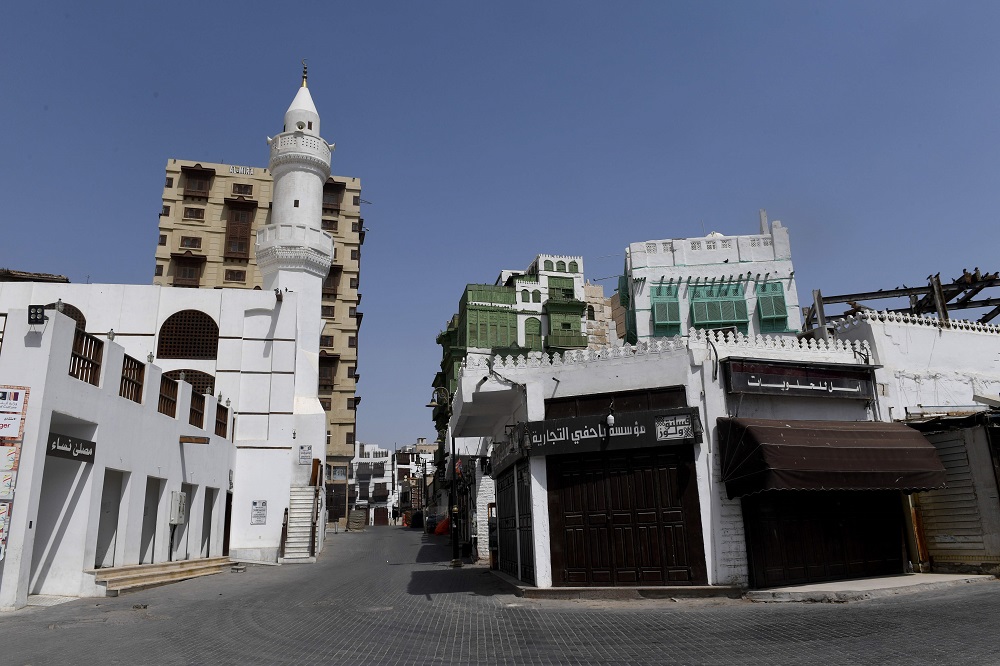
Above, the old town of Saudi Arabia’s Red Sea coastal city of Jeddah looks deserted after a lockdown was implmented to stem the spread of coronavirus. (AFP)
06:30 – The Omani Ministry of Health reported 33 new cases of coronavirus infections, bringing the total number in the country to 331.
06:00 - The chairman of the property developer Emaar, Mohamed Ali Alabbar, told staff he will take a 100% pay cut during the economic crisis brought on by the COVID-19 pandemic.
It’s part of what he called in an email to all 6,600 employees, a “new company-wide salary structure,” that will see most take a cut of varying amounts, until further notice.
04:55 – Thailand reported 51 new coronavirus cases and three more deaths, according to a spokesman for the government’s Center for COVID-19 Situation Administration.
00:15 – Morocco has recorded 31 new coronavirus cases, bringing the total to 1,021 with 70 deaths and 76 recoveries.
Sunday, April 5 (All times in GMT)
20:35 – Tunisia has confirmed 21 new COVID-19 cases, bringing the total to 574.
19:40 – Saudi Arabia has detected 17 new coronavirus cases, increasing the total to 2,402 with 488 recoveries.
18:35 – Egypt has announced 103 new coronavirus cases, seven deaths and six recoveries. The country’s totals are currently at 1,173 infections, 247 recoveries and 78 deaths.
18:30 – The UAE government is freeing up more cash to boost the local economy after it cut by half the reserve requirement for demand deposits, giving local lenders a wider latitude in managing their money amid the coronavirus pandemic.
18:25 – Jordan has confirmed 21 new COVID-19 cases and 36 recoveries, increasing the total to 345 infected persons and 110 recovered.
17:25 – The Lebanese Embassy in Paris on Sunday said it was providing monetary support to students stuck in France after the country imposed a lockdown on March 17 curb the spread of coronavirus.



